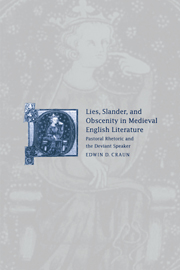 Lies, Slander and Obscenity in Medieval English Literature
Lies, Slander and Obscenity in Medieval English Literature Published online by Cambridge University Press: 31 October 2009
By claiming that post-Lateran pastoral texts on the Sins of the Tongue constituted a type of discourse to be reproduced in pastoral speech, I mean to convey several interwoven dimensions of the texts this chapter will explore. As I have established, these texts were produced by a powerful social group within an institution at a historical moment, and they mark out a position of knowledge and authority for the speaker: the priest as preacher, confessor, and all-around catechist. This position involves certain conceptions of the verbal sign and certain categories of analysis, insistently ethical, which together draw the boundaries between the salvific or normative in speech and the destructive or deviant. As they represent speech in sharply defined, value-laden ways, these texts also present a rhetoric which works to persuade the authoritative speaker and, through him, individuals in his cure to adopt these concepts, values, and categories – above all, to adopt the verbal practices dictated by these ways of framing speech. Thus, discourse on the Sins of the Tongue is an instrument of pastoral power as presented by Michel Foucault: it aims to insure the salvation of individuals by imposing on them a “law of truth” which they recognize as valid in their consciences.
THE WORD AS “MESSENGER OF REASON”: AN AUGUSTINIAN SEMIOTIC
Pastoral discourse on the Sins of the Tongue is shaped by the simple fact that its subject involves its medium: words.
To save this book to your Kindle, first ensure [email protected] is added to your Approved Personal Document E-mail List under your Personal Document Settings on the Manage Your Content and Devices page of your Amazon account. Then enter the ‘name’ part of your Kindle email address below. Find out more about saving to your Kindle.
Note you can select to save to either the @free.kindle.com or @kindle.com variations. ‘@free.kindle.com’ emails are free but can only be saved to your device when it is connected to wi-fi. ‘@kindle.com’ emails can be delivered even when you are not connected to wi-fi, but note that service fees apply.
Find out more about the Kindle Personal Document Service.
To save content items to your account, please confirm that you agree to abide by our usage policies. If this is the first time you use this feature, you will be asked to authorise Cambridge Core to connect with your account. Find out more about saving content to Dropbox.
To save content items to your account, please confirm that you agree to abide by our usage policies. If this is the first time you use this feature, you will be asked to authorise Cambridge Core to connect with your account. Find out more about saving content to Google Drive.